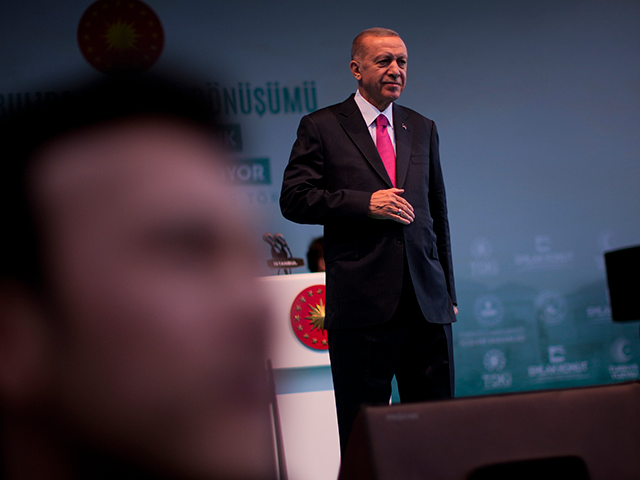Turkish President Recep Tayyip Erdogan abruptly ended a live television interview on Tuesday night, suddenly falling ill and attributing his inability to continue to a stomach illness.
Erdogan described his mysterious ailment as a “minor inconvenience” in a statement posted to social media on Wednesday, confirming he would not make any public appearances that day. His campaign announced the cancellation of several other campaign rallies and that he would only appear “virtually” at an event inaugurating the Russian-built Akkuyu Nuclear Power Plant on Thursday, which Russian leader Vladimir Putin will also address on live video from Moscow.
The cancelations have fueled wild speculation online that Erdogan is suffering from a much more severe illness than the presidential office is suggesting. Accounts on Twitter and Telegram have claimed, without substantiating evidence, that Erdogan suffered a heart attack or was poisoned by a Russian official. Some anonymous accounts have claimed that Erdogan is hospitalized, and officials have rushed his family to his bedside.
Erdogan’s office has denied all such claims.
Erdogan’s health became a campaign issue on Tuesday during an interview on the Turkish broadcaster Kanal 7. Erdogan was not on camera when he initially indicated to producers that he could not continue the discussion and was forced to leave.
Erdogan posted a message to his Twitter account on Monday thanking supporters for their well-wishing and insisting his illness was “minor.”
“I would like to thank each and every member of my noble nation, each of my brothers and sisters, who conveyed their thoughts and prayers over the minor inconvenience I had during the broadcast due to my busy work,” the statement read. “Today, I will rest at home on the advice of doctors. … With God’s permission, we will continue our program from tomorrow.”
The presidential office later confirmed that Erdogan would not appear in person at the power plant opening event, fueling rumors of his demise.
Reports in Turkish media noted on Thursday that social media channels, many of them of dubious origin and failing to identify sources, claimed that the true nature of Erdogan’s illness was severe heart disease and that he had suffered a heart attack. Others suggested that he had been poisoned and that the crime had occurred during a meeting with Russian officials. While Turkey is formally a member of NATO, Erdogan’s tenure in power has been defined by marked friendliness towards Moscow, leaving unclear why Russian officials would poison him.
Other accounts claimed, without specifying the reason, that Erdogan had been hospitalized and his family rushed to his bedside in anticipation of his death.
The Turkish presidential office issued a statement late Wednesday denying the rumors and stating that Erdogan was recovering without incident. Ankara expects, a top spokesman affirmed, that Erdogan will speak via teleconference at the nuclear power plant event, showing his face to the public. Turkish Vice President Fuat Oktay described Erdogan’s condition as “very good,” but added to the confusion by describing him as recovering from a “slight cold,” a different ailment than what the government had initially claimed.
The Islamist Turkish president is currently in the middle of an intense re-election campaign in the leadup to the May 14 elections. His primary challenger, opposition Republican People’s Party (CHP) leader Kemal Kılıçdaroğlu, has performed well enough in recent polls to potentially win the race, thanks in part to other opposition parties uniting in a coalition behind him and the left-leaning People’s Democratic Party (HDP), a pro-Kurdish outfit, failing to run its own contender. The CHP leader has also benefitted from public outrage in response to Erdogan’s perceived mishandling of the devastating earthquakes that killed tens of thousands in eastern Turkey in February.
While Kılıçdaroğlu appears to have amassed significant popular support against Erdogan, Turkey has experienced multiple unfree and unfair elections under the current president. Erdogan’s opponents have faced imprisonment, voter suppression, and mob violence. Kılıçdaroğlu himself was forced to cancel some public appearances last week after Islamist mobs physically attacked his convoy.
On the same day Erdogan became sick on television, Turkey police executed raids on political dissidents that resulted in the arrests of 110 people, including local opposition politicians allegedly affiliated with Kurdish separatist groups.
